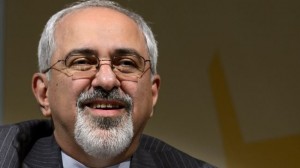 Iran's sales pitch for the Geneva nuclear deal got a lively reception on Tuesday at a packed Tehran University auditorium, where the country's lead negotiator defended the accord and called for unity among sniping political factions.
Iran's sales pitch for the Geneva nuclear deal got a lively reception on Tuesday at a packed Tehran University auditorium, where the country's lead negotiator defended the accord and called for unity among sniping political factions.Cheers erupted repeatedly as�Foreign Minister Mohammad Javad Zarif�laid out the case for an agreement that halts Iran�s most sensitive nuclear work for six months in exchange for modest sanctions relief, while a comprehensive final deal is negotiated.
�Those that are afraid of negotiations�that see themselves as too small, they think they are too weak. They don�t believe in the power of the people,� Mr. Zarif told the crowd of hundreds jammed into the university hall, while others watched a TV feed in another another auditorium. �Foreign policy should not be a battleground of factions, it should be a field of unity.�
Iranians breathed a sigh of relief when the landmark accord was reached Nov. 24 between Iran and six world powers. While many welcomed the promise of a gradual easing of sanctions and tension with the West, hardliners remained unconvinced � one reason why Zarif was speaking directly to an Iranian audience.
The deal halts Iran's most sensitive nuclear work for six months in exchange for modest relief of sanctions that have crippled Iran's economy. It�s a temporary agreement meant to pave the way for a much broader, final deal that will limit Iran's nuclear program so that it can only ever be used for peaceful purposes.
During the two-hour forum, Zarif took on the role of salesman-in-chief, in a political arena where the risks are high, as hard-line critics circle to attack.
�We should believe in ourselves,� Zarif told the students, stating that the surprise election of centrist�President Hassan Rouhani�was an �epic� that �created national power� and a new fearlessness at the negotiating table.
The crowd was largely supportive of Zarif, booing and shouting down hard-line students who accused Zarif of giving away too much, sacrificing Iran�s �right� to enrich uranium, and selling out a prized nuclear program for cash.
Zarif quieted those who booed, and said their criticism reflected the doubt of skeptics� many of them hardliners mistrustful of the West, and opposed to Rouhani. He said those skeptics had incomplete information and had fallen for Washington�s spin on the deal. Both the�US�and Iran declared victory in the aftermath of the deal, in large measure to convince their own domestic�doubters.
Zarif held his head in his hands in exasperation when asked to explain, for example: If Iran had now stopped its uranium enrichment to 20 percent purity and did away with its stockpile of the stuff, what cards were left to make the final agreement? What about the White House's insistence that enrichment is not part of this deal, while Zarif said the text clearly showed that it was?
Stopping 20 percent enrichment and rolling back the stockpile was a top priority for the six world powers negotiating for Iran, because the material is a few technical steps from weapons-grade levels of 90 percent enrichment. Iran says it rejects nuclear weapons, and that its program is only for peaceful purposes like producing electricity and medical isotopes.
Taking questioners to task
While welcoming the criticism, Zarif took the questioners to task, saying they should not listen to US statements aimed at a domestic audience and its ally Israel. He said critics should read the deal itself, which describes a future, negotiated level of uranium enrichment.
Zarif also spoke of recent years when he was essentially in political exile, as an arch-conservative held office in Tehran and criticized Zarif�s service to the previous reformist administration.
"For eight years � eight years � I heard all kinds of lies, things against me, mocking, and did not speak a word," Zarif said. "I expected our friends to give us eight weeks of time [before criticizing again]�without us even going to the negotiating table, they had already said that we had lost."
Zarif reminded the students that Supreme Leader Ayatollah Ali Khamenei had referred to negotiators as �sons of the revolution� who should not be called �compromisers,� and that he had guided the talks at every stage.
Iran had not retreated from its red lines in any way, Zarif said, and steps could be reversed within 24 hours � just as Washington has made clear that the modest sanctions relief agreed with Iran was reversible at any time.
�I will stand up to the Western side, but I need your help,� he said.
Hardliners lack numbers
Farideh Farhi, an Iran expert at the University of Hawaii who is currently in Tehran,�says hardliners don�t have significant support for their arguments.
�But if the negotiating team can�t deliver, maybe on sanctions, then [the hard-line] argument will become more powerful: that this is an unbalanced deal, and the other side is not willing or is unable to deliver,� Ms. Farhi says. �The election showed that they don�t have the numbers, though they have a loud voice.�
Some students were quick to contrast the stalemate in nuclear talks under Rouhani's predecessor, Mahmoud Ahmadinejad, with the pace of negotiations under the new administration.
�This is the new way, we need a new atmosphere,� said Kevan, a law student. He noted that Rouhani and Zarif both had degrees from Western universities, and therefore �know the West� and know how to deal with the US superpower.
�If a person like Zarif goes to a high level in my government, it means change,� said Kevan, who like several students interviewed�asked that only his first name be used.���Now is it very important for the good behavior of the [Americans]. Zarif has many pressures on him.�
By The Christian Science Monitor�
The Iran Project is not responsible for the content of quoted articles.










